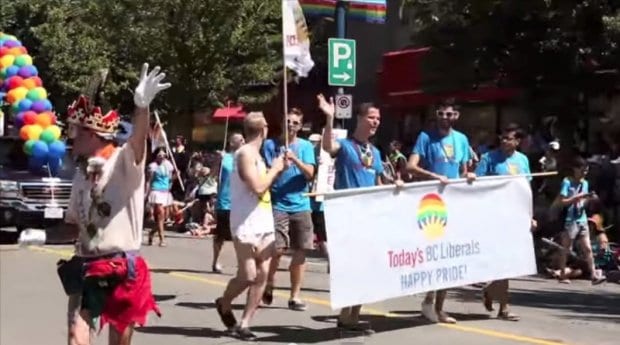The Vancouver Pride Society (VPS) mandatory pledge to support trans rights must be signed by a senior official of a political party or that party will not be allowed to march in the Pride parade, the VPS board of directors announced July 22.
“We’re taking a hard line because it’s important to the trans community,” VPS vice president Chrissy Taylor tells Daily Xtra.
“Not a riding association, not an electoral district,” Taylor says. “We had to make it clear it’s somebody with authority on behalf of the party itself.”
The pledge is part of the VPS’s Trans Equality Now (TEN) campaign.
“The purpose of the pledge is to highlight the need for equality legislation supporting the trans and gender-variant community and it’s also to raise awareness on the issue,” VPS executive director Ray Lam told Daily Xtra July 10.
The BC Liberal Party has not signed the pledge, executive director Laura Miller tells Daily Xtra.
Miller says the Liberal party’s Vancouver-West End riding association had signed the pledge and was confirmed to walk in the parade.
“The Vancouver Pride Society has since kicked them out,” she says.
The party’s West End riding association signed the pledge, but party executives won’t sign it.
“Vancouver Pride Society has drawn a line in the sand: Sign the pledge or don’t march,” Miller says. “As much as we might want to participate, we will not change our point of view to do so.”
That point of view, Miller says, is that the party’s policy is clear on trans rights.
“Every individual is equal,” she says. “Every individual has the right to protection under BC’s Human Rights Code, which is inclusive of transgender and gender-variant people. Where we differ is whether these protections need to be explicitly stated.”
On July 15, Attorney General Suzanne Anton told the BC legislature that trans rights are protected under the law though not explicitly stated in the code.
Gay Vancouver West End NDP MLA Spencer Chandra Herbert asked Anton why the government would not extend explicit human rights protections to transgender British Columbians.
Responded Anton, “The issue of gender identity and the human rights code of British Columbia is crystal clear. Our human rights code protects all persons, no matter what their gender identity is, which I think is the issue at question. It is crystal clear. The law is crystal clear. They are protected.
“We can be proud of that in British Columbia — that our courts have been so clear about that, that we are so clear about that. The protections are there in the human rights code,” Anton said, according to the Hansard record of debate.
On July 20, Chandra Herbert introduced his fourth private member’s bill since 2009 to provide trans people with explicit code protections in BC.
While the bill could return for debate in a fall session, Chandra Herbert says he just does not understand the Liberals’ steadfast refusal thus far to explicitly protect trans people in the code.
“It’s not enough to tell people everyone’s protected,” he tells Daily Xtra. “You have to read it in black and white.”
He says provincial governments of all political stripes across Canada have enacted trans rights protections.
“I don’t get why BC is . . . standing alone in this,” he says.
The VPS is encouraging the BC Liberals to sign the pledge and support Chandra Herbert’s bill to include gender identity in the BC Human Rights Code.
The VPS says Chandra Herbert’s bill is a chance for the Liberals to effect real change for trans people and supporting it would fulfill the pledge’s requirement to protect trans and gender-variant people in the code.
“Premier Christy Clark has long considered herself a champion of anti-bullying, so we would welcome her taking a stand for our community,” Taylor says.
The Liberals’ ejection comes a week after Daily Xtra revealed questions surrounding whether or not the federal Conservative party had signed the pledge in Vancouver Centre.
What exactly happened remains unclear as the VPS has not acknowledged a Daily Xtra July 10 request to see all federal and provincial political parties’ signed pledge forms.
But, says Taylor, the VPS decided when it comes to political organizations, it must be a governing body of the party that signs the pledge. That applies to the Conservatives as well, Taylor says.
“The TEN Pledge returns the VPS to its roots and the Society is taking a firm and public stance in support of a marginalized part of our community,” Taylor says in a VPS news release.
Pride parade coordinator Bry Leckie says no political party will receive special treatment for the parade.
“Political parties that march must sign the pledge on behalf of the party. If they refuse to stand up for LGBTQ2+ rights, they have no place at the parade,” Leckie says.
Any elected official or candidate for election must also sign the pledge to participate in the parade.
The BC Liberals expressed disappointment at the parade policy shift.
“Pride has always celebrated diversity and inclusiveness,” Miller says. “It’s disappointing that this pledge has changed that.”
Lam says signing the pledge is an agreement to support the Pride Society’s core values. “Promoting human rights and equality is one of our core values,” he says.
The pledge is part of Pride being a political event, he adds. “Pride is absolutely political.”

 Why you can trust Xtra
Why you can trust Xtra


